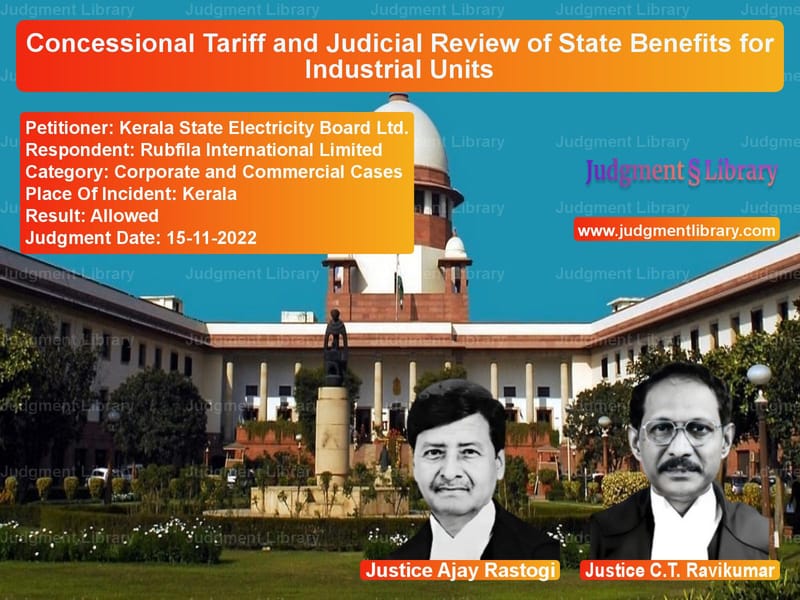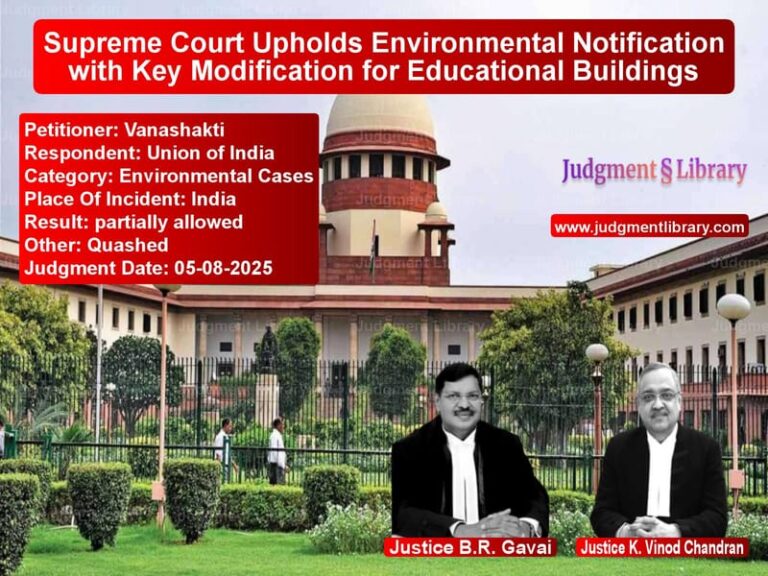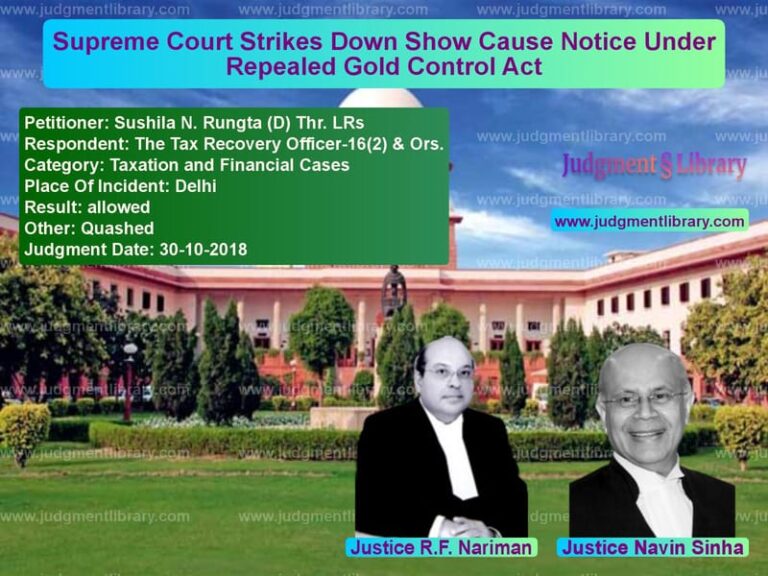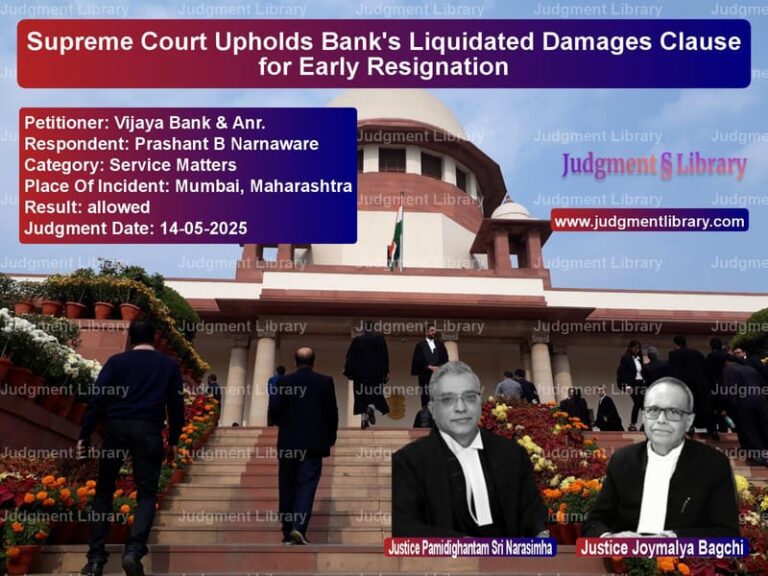Concessional Tariff and Judicial Review of State Benefits for Industrial Units
The case before the Supreme Court dealt with the issue of concessional tariff provided to industrial units by the Kerala State Electricity Board (KSEB) under the Government Order (GO) dated 6th February 1992, and the judicial review of the decision denying such benefits to the respondent, Rubfila International Ltd. The controversy arose over the entitlement of the respondent to a 5-year exemption from enhanced power tariffs from the date of energisation, following the precedent set in the case of another industrial unit, M/s Patspin India Ltd. The question of whether parity could be claimed by the respondent under the same benefits granted to M/s Patspin India Ltd., despite the subsequent withdrawal of those benefits, was a central point of contention in this case.
Background of the Case
Rubfila International Ltd., an industrial unit that started its commercial production on 26th March 1995, sought benefits under the GO dated 6th February 1992, which provided exemptions on enhanced power tariffs for new industrial units starting commercial production between January 1, 1992, and December 31, 1996. The dispute arose when Rubfila claimed a 5-year exemption from the date of energisation, i.e., 16th September 1995, instead of the date of commercial production, 26th March 1995, as per the stipulation in the GO. The appellant, KSEB, rejected this claim, arguing that the date of commercial production should be used to determine the duration of the tariff exemption.
The initial judgment of the Kerala High Court (Division Bench) in 2005 confirmed that the respondent was entitled to the benefit of the concessional tariff starting from the date of commercial production (26th March 1995), rejecting the appellant’s claim that the exemption should apply from the date of energisation. However, the respondent, after the review petition was filed, sought parity with M/s Patspin India Ltd., which had been granted the benefit of concessional tariff from the date of energisation. This led to further litigation, resulting in the dismissal of the review application by the High Court in 2019.
The Legal Arguments
The appellant, KSEB, argued that Rubfila’s claim for a tariff exemption from the date of energisation was not supported by the provisions of the GO, which clearly stipulated that the exemption should apply from the date of commercial production. Furthermore, the appellant contended that since the benefits granted to M/s Patspin India Ltd. had been withdrawn, Rubfila should not be entitled to claim parity with that unit.
The respondent, Rubfila International Ltd., on the other hand, argued that the GO allowed for the exemption to be applied from the date of energisation in the case of some industrial units, including M/s Patspin India Ltd. The respondent also claimed that since it had been granted similar benefits by the KSEB in the past, it was entitled to the same treatment under the principle of parity. Additionally, Rubfila contended that the withdrawal of benefits granted to M/s Patspin India Ltd. did not negate the principle of parity that had been previously established.
Read also: https://judgmentlibrary.com/icsi-election-dispute-supreme-court-reinstates-elected-office-bearers/
The Court’s Consideration
The Court started by examining the GO issued by the Government of Kerala on 6th February 1992, which provided for a five-year exemption on enhanced power tariffs for new industrial units starting production between January 1, 1992, and December 31, 1996. The Court noted that while the date of commercial production was specified in the GO, the appellant had, in some cases, granted tariff exemptions from the date of energisation. The respondent argued that this practice should extend to its case as well, based on the principle of parity. However, the appellant contended that this practice had been limited to certain cases and had been revoked for M/s Patspin India Ltd. in 2001.
The Court also considered the argument that M/s Patspin India Ltd. had been granted the concessional tariff from the date of energisation, but the appellant had withdrawn that benefit by order dated 22nd November 2001. The Court examined the legal implications of this withdrawal, noting that the respondent’s claim for parity was based on a now-withdrawn benefit. The appellant’s counsel argued that the withdrawal of the benefit from M/s Patspin India Ltd. removed any basis for the respondent to claim the same treatment.
The Court also noted that the respondent had been granted the tariff exemption from the date of commercial production (26th March 1995), and this had been upheld by the Division Bench of the Kerala High Court in 2005. The subsequent litigation and review application focused on whether the respondent could claim parity with M/s Patspin India Ltd. Despite the withdrawal of benefits from that unit, the respondent maintained that its claim for the same exemption was valid under the principles of fairness and equality.
The Court’s Judgment
The Court ultimately ruled in favor of the appellant, KSEB, setting aside the High Court’s judgment and confirming that the respondent, Rubfila International Ltd., was not entitled to the concessional tariff exemption from the date of energisation. The Court reasoned that the respondent’s entitlement to the benefit should be governed by the date of commercial production, as specified in the GO. The Court also noted that the withdrawal of the benefit from M/s Patspin India Ltd. had removed any basis for granting parity to the respondent.
However, the Court also held that the respondent was still entitled to the benefits of the concessional tariff for the period from the date of commercial production (26th March 1995) to the end of the five-year period, as initially granted. The Court further emphasized that the decision in favor of the appellant did not affect the respondent’s entitlement to the tariff exemption, but it did clarify that the benefits should be calculated based on the date of commercial production rather than the date of energisation.
Conclusion
This judgment provides important clarification on the interpretation of government orders and the principles of parity in the granting of benefits to industrial units. The Court highlighted the importance of adhering to the provisions of the applicable government orders and emphasized that benefits should be granted based on clear legal provisions rather than practices that may have been applied inconsistently. The judgment also reaffirmed the principle that the withdrawal of benefits from one unit removes the basis for parity claims by other units. The ruling underscores the need for fairness and consistency in the application of government policies, particularly when it comes to the granting of concessions and exemptions.
Petitioner Name: Kerala State Electricity Board Ltd..Respondent Name: Rubfila International Limited.Judgment By: Justice Ajay Rastogi, Justice C.T. Ravikumar.Place Of Incident: Kerala.Judgment Date: 15-11-2022.
Don’t miss out on the full details! Download the complete judgment in PDF format below and gain valuable insights instantly!
Download Judgment: kerala-state-electri-vs-rubfila-internationa-supreme-court-of-india-judgment-dated-15-11-2022.pdf
Directly Download Judgment: Directly download this Judgment
See all petitions in unfair trade practices
See all petitions in Corporate Governance
See all petitions in Bankruptcy and Insolvency
See all petitions in Judgment by Ajay Rastogi
See all petitions in Judgment by C.T. Ravikumar
See all petitions in allowed
See all petitions in supreme court of India judgments November 2022
See all petitions in 2022 judgments
See all posts in Corporate and Commercial Cases Category
See all allowed petitions in Corporate and Commercial Cases Category
See all Dismissed petitions in Corporate and Commercial Cases Category
See all partially allowed petitions in Corporate and Commercial Cases Category







